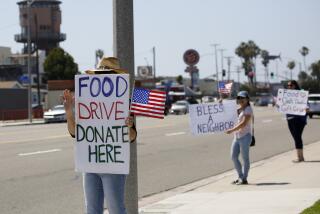Do You Tithe? What We Owe Our Churches
- Share via
On a recent Sunday, I picked up a pledge card for my congregation’s Year 2000 Stewardship Campaign, and over the next few weeks my wife, Nancy, and I will decide what kind of financial commitment we’ll make to support Calvary Presbyterian Church throughout the new year. We’ve been giving $140 a week, or 7% of our income, and we will probably increase that--although just how much is always a point of debate. As Calvary’s minister, I obviously have a personal interest in a successful pledge drive, and I push to give as much to the church as we can. Nancy, being more broadly altruistic, wants to increase the amount we give to causes that do not benefit us personally.
I tell this story not to expose our family finances to public scrutiny, but to illustrate just how tricky the issue of money and the church can be, especially during this season of pledge campaigns. For starters, charitable giving is difficult to talk about, personal finances being one of our society’s last truly private areas. Donating to the church is an odd mixture of generosity and personal investment. That’s certainly true for me, a member of the clergy, but also for parishioners who find the church pays benefits to them and their families in the form of youth groups, counseling sessions, parenting classes and activities for seniors. It is hard to discern what really inspires people to support the mission and ministry of the church: a good “return” on their investment, gratitude to God, a sense of responsibility, satisfying music and preaching, or the pure joy of giving?
*
This wide range of motivations makes fund-raising even tougher for church leaders, who quickly discover that what stimulates one donor can alienate another. A few summers ago, a woman started attending the church and loved it, expressing thanks for the spiritual messages she was hearing. Then we entered our fall pledge campaign. I tried to explain that this was a temporary but necessary campaign, but she became so disgusted by appeals for money that she left and has not returned.
Many people don’t realize that the heart of any appeal for church funds is “stewardship”--the belief that all of our resources belong to God, and that our primary responsibility is to be wise and generous stewards of what we have been given. A biblical guideline of 10% of income going to the church is called a “tithe.” “It’s not remarkable that we are to give God 10%,” a particularly committed member of Calvary told me several years ago. “What’s amazing is that God lets us keep 90%.”
But a study by a Christian research organization, Empty Tomb Inc., shows that churchgoing Protestants give an annual average of less than 2.5% of their household income to churches, down from 3.3% at the height of the Depression.
But the biblical tithe reflects a time when the church wasn’t competing with so many other organizations for charitable donations. Moreover, as Dan Franklin, chairman of Calvary’s stewardship campaign, said to me recently, “there’s a lot of competition for resources today: College tuition continues to rise, and most middle-class people are not eligible for scholarships. Besides federal taxes of 20% to 28%, Social Security and Medicare consume more than 7% of our income, with state taxes taking another 4% to 6%.”
Church services must be free and available to anyone with a spiritual need; but someone has to pay for the upkeep of church buildings, mission efforts and salaries. At our church, like most others, the annual budget depends almost entirely on contributions from the membership. The national average is that 20% of the people do most of the giving.
Unfortunately, several trends threaten to undermine this pledge base. First, more and more people are coming to church seeking an introduction to God or Jesus, not to learn about the obligations of being part of a congregation. Research shows that today’s younger adults are often believers but not belongers--they have a commitment to their faith, but not necessarily to a congregation.
Now I’m not the kind of pastor who uses high-pressure tactics or only talks about money--honest, you can check my sermon file--but I do confess these trends worry me. One solution might be to send bills to active members with a specific recommendation of what each person should give. “Almost every synagogue sets dues and bills its members,” Rabbi Jack Moline of Agudas Achim Congregation in Alexandria, Va., tells me. “Since we do not handle money on Shabbat, when most people gather, we cannot ‘pass the plate.’ Dues also distribute equitably the burdens of the upkeep of the congregation, rather than depending on those to whom the pastor or fund-raiser has immediate access. At the same time, every synagogue delivers the message with every bill or solicitation that no one will be turned away for lack of resources.” While I admire this clear-eyed view of the needs of a Jewish congregation and the responsibility of each member, I doubt it would work in a Protestant church with a long tradition of an offering being a truly free gift.
People put their money into what matters to them, whether it is a congregation or a car, and it probably makes no difference whether you call the payment an offering or an obligation.
*
The challenge is to get people so excited about the life of the church that those who are able want to invest more each year in its ministry and mission. This requires a focus not on money, but on what the money can do for the church or the community or the world. While few of my parishioners are going to feel a rush of satisfaction from funding a parish electric bill, many are happy to support mission projects that feed the hungry, tutor neighborhood schoolchildren or purchase medical equipment for a hospital in Ghana. Mission giving is the engine that drives a church’s budget, but unfortunately it is the part that often gets stripped when a congregation encounters difficult times.
I’m committed to the idea that churches can--and should--help solve society’s problems. But I’m not fooling myself. I know that many people don’t belong to a church and not all churchgoers are prepared to tithe. Still, I can’t help imagining how much churches and the segment of society helped by churches would benefit if everyone would just dig a little deeper when the plate is passed.


